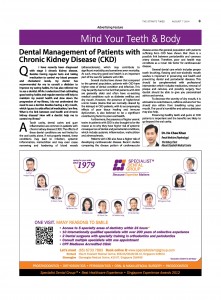 This article first appeared in the August 7th, 2014 issue of The Straits Times Mind Your Body. We have reproduced it for the information of those of you who missed it when it was published.
This article first appeared in the August 7th, 2014 issue of The Straits Times Mind Your Body. We have reproduced it for the information of those of you who missed it when it was published.
Q: I have recently been diagnosed with stage 3 chronic kidney disease. Besides having regular tests and taking medication to control my blood pressure and cholesterol levels, my doctor has recommended for me to consult a dietician to improve my eating habits. He has also referred me to see a dentist. While I understand that cultivating good eating habits and regular exercise will help to maintain my overall health and slow down the progression of my illness, I do not understand the need to see a dentist. Besides having a dry mouth, which I guess is a side effect of medication, I am fine. What is the link between oral health and chronic kidney disease? How will a dentist help me to control my illness?
A: Tooth cavity, dental caries and gum inflammation are common in patients with chronic kidney disease (CKD). The effects of these dental conditions are not limited to the oral cavity alone. If not properly treated, these conditions may lead to infection, systemic inflammation, malnutrition and may even cause narrowing and hardening of blood vessels (atherosclerosis), which may contribute to significant morbidity and sometimes even mortality. As such, ensuring good oral health is an important part of the care for patients with CKD.
Several studies have shown that compared to the general population, patients with CKD have higher rates of dental condition and infection. This may be partly due to the fact that patients with CKD are generally older and often have co-existing medical conditions such as diabetes mellitus and dry mouth. However, the presence of higher-level uremic toxins (toxins that are normally cleared by the kidneys) in CKD patients, with its accompanying effects of poor tissue healing and immune dysfunction, is also believed to be a significant contributing factor to poor oral health.
Furthermore, the presence of higher uremic toxins in patients with CKD is also thought to be the reason as to why they have higher risk of systemic consequences of dental and periodontal conditions, which include systemic inflammation, malnutrition and atherosclerosis.
Patients with CKD also have a higher risk of developing cardiovascular disease. Recent studies comparing the disease pattern of cardiovascular disease across the general population with patients suffering from CKD have shown that there is a possible link between periodontitis and coronary artery disease. Therefore, poor oral health may constitute as a novel risk factor for cardiovascular disease.
General dental care which includes proper tooth brushing, flossing and non-alcoholic mouth washes is important in preserving oral health and preventing dental and periodontal diseases. This should be complemented with professional intervention which includes medication, removal of plaque and calculus, and possibly surgery. Your dentist should be able to give you personalised advice and service.
To decrease the severity of dry mouth, it is advisable to avoid tobacco, caffeine and alcohol. You should also refrain from breathing using your mouth. The use of a humidifier and saliva substitutes may also help.
Preserving healthy teeth and gums in CKD patients is important and the benefits are likely to go beyond the oral cavity.
Renal Medicine (Nephrology)
Mount Elizabeth Medical Centre






